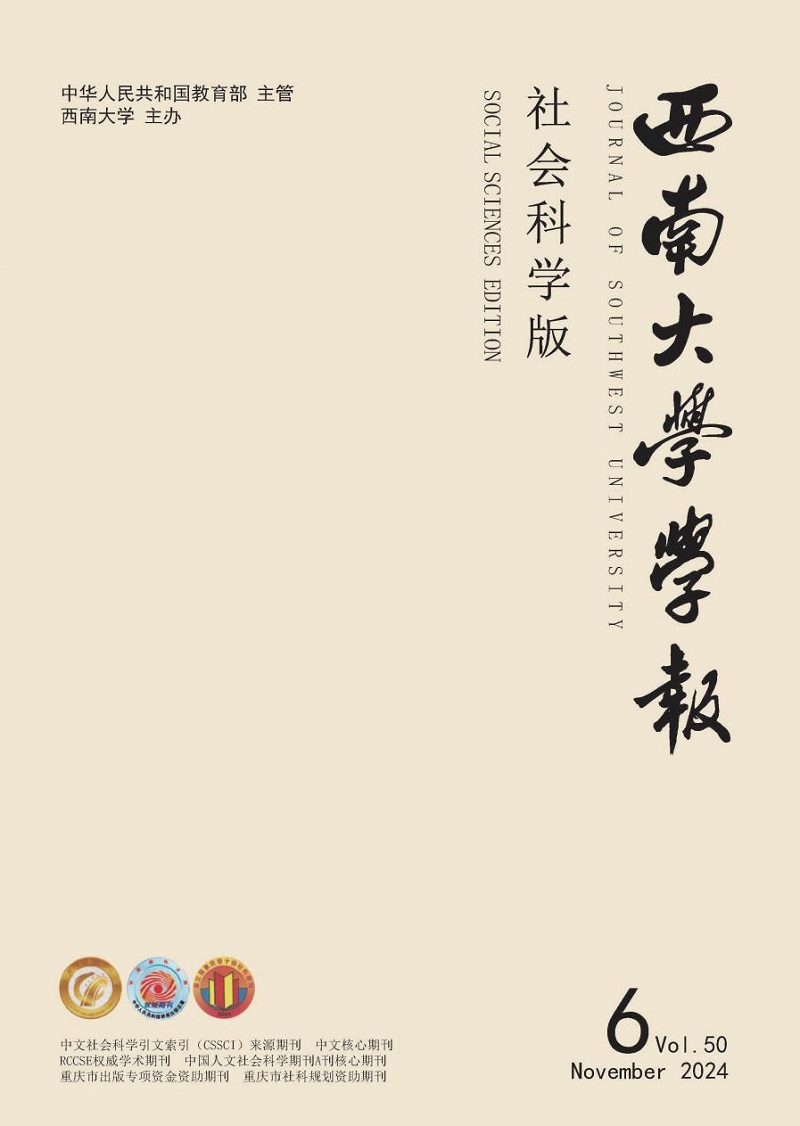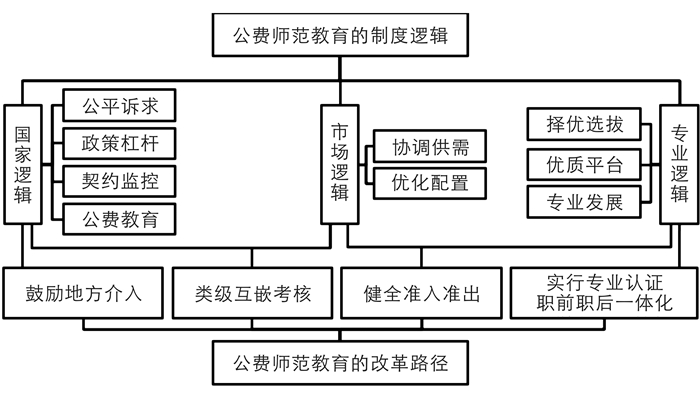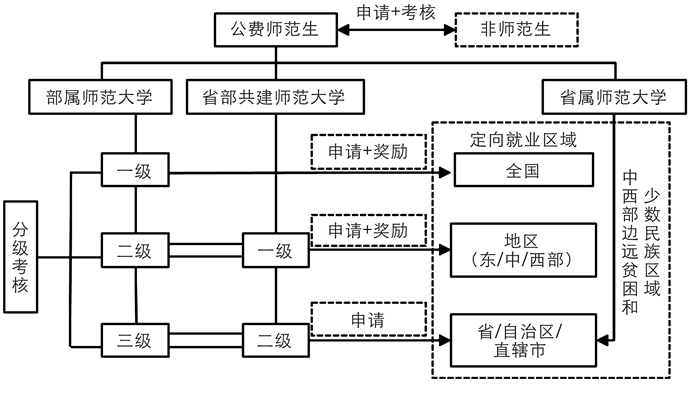-
作为我国补充优质师资、促进教育公平的重要政策之一,公费师范教育经历了自2007年在教育部直属师范大学试点实施的起步阶段、2013年向部分地方师范院校拓展的完善推进阶段、以2018年《教育部直属师范大学师范生公费教育实施办法》(以下简称《办法》)的出台为标志,将“师范生免费教育政策”调整为“师范生公费教育政策”的转型阶段。自2007年政策出台以来,已“累计招收公(免)费师范生超过11万人”[1],为我国基础教育输送了大量优质的教师资源,为促进我国教育公平发展提供了有力的人力资源支撑。
但是,在公费师范教育政策实施过程中,不同利益主体之间的价值冲突逐渐显现,一定程度上影响了政策的实施效度。学界已有研究关注任教农村的履约规定与毕业生就业期望之间的冲突,发现农村地区对公费师范毕业生缺乏吸引力,农村地区的生活环境、工作环境及发展前景是部分公费师范生拒绝长期扎根农村的主要因素[2]。就读一流大学的教育福利使部分不乐教的学生,牺牲专业兴趣选择了公费师范教育,学术兴趣与定向就业之间的矛盾也是部分公费师范生毕业后未能长期从教的因素之一[3]。农村生源地公费师范生需要面临在农村接受初级、中级教育,进入城市接受高等教育,返回农村任教的生活轨迹,经历着城乡内在身份变迁的期望与落差[4],其本质为公费师范生提高社会地位的期望与公费师范教育政策公平旨趣之间的价值冲突[5]。有研究发现公费师范教育的培养模式与用人单位需求之间的匹配度有待提升,在价值引导以及课程设置方面,普通教师教育培养模式未能充分考虑师范生高等教育前的学习经历以及农村地区的教育需求,任教农村的公费师范生面临职前教育形成的知识体系实践适用性不高的困境[6]。概而观之,国家、高校、师范生、用人单位等利益主体之间的潜在矛盾影响着政策的实施效度,但目前少有研究以制度逻辑观照公费师范教育制度场域中各主体间的价值冲突。为实现政策理想与实施效度的真正契合,本文从制度逻辑视角探究公费师范教育的政策意蕴与价值旨归,并以制度逻辑间的协调互补为内在机理,提出有效的改革路径,以期完善公费师范教育政策。
HTML
-
罗格尔·弗利南德(Roger Friedland)和罗伯特·R.阿尔弗德(Robert R. Alford)提出,社会是一个存在潜在矛盾的制度间系统,个人之间相互竞争与协商、组织之间有冲突与协调、制度之间彼此矛盾并相互依赖,只有将个人和组织的意识与行为置于社会背景中,以制度逻辑的视角描述并解释行动主体与其所处的社会场域之间的关系,才能理解社会系统中利益主体的行动出发点及冲突缘由[7]。社会场域由不同制度逻辑间的相互作用建构,如家庭制度、市场制度、科层管理制度、宗教制度等[8]。制度逻辑是由社会建构的文化符号、实践形态、假设、价值和信念的历史模式,个体通过这些模式为其日常活动赋予意义,制度逻辑具有符号性和物质性,前者以抽象的概念化意指为表征,后者体现为具象的社会关系与社会实践行为[9]。个体和组织的利益、身份、价值、假设都蕴含在制度逻辑中,成为指导或约束个体与组织行为的潜在行动规则[10]。当多种制度逻辑并存时,制度逻辑间的相互博弈影响个体与组织的行为,制度环境表征为多重制度逻辑间的相互冲突与整合[11-12]。个人和组织通过探索和解决不同制度间的潜在矛盾,改变或转换场域内不同制度之间的关系[7]。可以说,制度逻辑是对过度强调能动性的主观主义与过度强调组织权力支配性的组织主义的折中,个人和组织的价值观、行为规范与信念由宏观制度语境形塑,同时其能动性也通过制度逻辑影响组织行为的结果。
制度逻辑为理解公费师范制度场域内各利益主体行为与决策的制度影响因素提供了理论分析框架。通过分析不同制度对各利益主体的影响作用,有助于明晰公费师范教育的价值旨趣与实施效果的制度影响因素。保罗·J.迪马吉奥(Paul J. DiMaggio)与沃尔特·W.鲍威尔(Walter W. Powell)认为强制性(Coercive)机制、模仿性(Mimetic)机制和规范性(Normative)机制是塑造组织场域的三种主要机制,其中,强制性机制以国家权力为主要表征,模仿性机制主要表现为应对不确定性而主动提高竞争优势的行为,规范性机制强调高度专业化[13]。艾略特·弗雷德森(Eliot Freidson)明确提出影响制度运行的三种制度逻辑,包括治理逻辑(Bureaucratic Logic)、市场逻辑(Market Logic)与专业逻辑(Professional Logic)[14]。其中,治理逻辑作用下,场域控制权由以企业为代表的内部管理机构,或以管理公共事业的国家行政机构为代表的外部机构掌握。帕特里亚·H.桑顿(Patricia H. Thornton)将组织逻辑中的外部机构分离出来,称其为国家逻辑(Logic of State)[8],可以说,弗雷德森提出的治理逻辑包含企业内部的管理逻辑与国家行政机构的国家逻辑。本文将迪马吉奥和鲍威尔的制度理论与弗雷德森的制度逻辑体系的内涵进行结合,将其融合为由国家逻辑、市场逻辑、专业逻辑构成的影响组织场域的结构因素为理论框架(见表 1),从师范生选拔录取、契约培养、激励机制等维度,探究公费师范教育场域内三种制度逻辑作用下产生的价值冲突。
-
运用科层权力规划、分配、监管专业工作是国家逻辑的核心要义,突出政府对劳动力资源的再分配作用。公费师范教育强调政府在教师资源的吸纳、培养与分配中发挥主导作用,蕴含着国家逻辑支配下自上而下的制度设计内涵。
1.公平诉求:师资均衡配置的目的旨趣
美国教育哲学家约翰·罗尔斯(John Rawls)认为“正义是社会制度的首要价值”[15]1,公平是国家教育制度设计的重要价值取向,而教育公平是实现社会公平的重要路径。瑞典教育家托尔斯顿·胡森(Torsten Husen)认为教育公平主要包括个体起点公平、过程公平以及结果公平[16]。公费师范教育政策统筹规划教师培养,均衡配置教师资源,充分发挥国家逻辑规划、分配专业人才的作用,努力实现三个维度的教育公平。
起点公平主要是指学生入学机会的平等。自高校扩招政策实施以来,农村和城市地区学生接受高等教育的机会均有大幅度增加,但是农村地区学生进入一流大学的比率却明显下降[17]。公费师范教育借助国家政策补偿,破解了有志从教的贫困生无法接受优质师范教育的困境,扩大了经济困难学生在一流院校接受优质教师教育的机会,从教育起点上保障弱势群体在入学机会以及教育质量方面享受教育公平。
教育过程的平等是保证学生获得同等学业成就的重要保障,公费师范教育运用国家逻辑的财政转移支付制度,保障区域、城乡义务教育阶段儿童以及公费师范生的教育过程平等。我国区域间、城乡间的经济发展差距较大,完全依赖市场机制容易导致师资配置结构性失衡,使经济欠发达地区的学生无法享受公平且有质量的教师资源。2019年,全国小学阶段专科及以上学历教师比例为97.3%,其中,城市小学为99.1%,农村小学为96.3%,城乡差距为2.8个百分点;全国初中阶段本科及以上学历教师比例达到87.4%,其中,城市初中为93.1%,农村初中为84.0%,城乡相差9.1个百分点[18]。财政转移支付制度是国家实现公平正义的重要制度设计,旨在促进公共服务均等化,提高公民福祉[19]。公费师范教育对接收公费师范毕业生的中西部地区给予一定的财政转移支持,将教师资源向中西部倾斜配置,规定“到城镇学校工作的公费师范生,应到农村义务教育学校任教服务至少1年”[20],以国家宏观调控实现供给侧与需求侧的有效对接,彰显了国家逻辑保证义务教育阶段过程公平的主导作用。为保障公费师范生在接受高等教育过程中的平等,国家对公费师范生的学费、住宿费、生活费予以补免,以国家财政补助排除原生家庭、社会、经济状况等不利因素对其学习过程产生的负面影响,保证公费师范生享有平等的教育资源。
教育结果平等指学生学业成就方面的机会相对均等,国家采取有效措施协助先天家庭教育不力者获得最大限度的学业成就。教师编制制度是国家主导下管理和调配教师资源的人事管理制度,是国家逻辑调控人力资源的重要制度杠杆。公费师范教育以入编入岗的就业机制保障公费师范生的学业成就,补偿公费师范生履约回归生源地及农村任教。国家逻辑利用编制杠杆调配人力资源,保障赋有不利因素的公费师范生的教育结果公平,是为了实现地区间、城乡间教师资源的均衡供应。
2.政策杠杆:政府干预形成的补偿机制
教育经济学视角下,教师作为教育人力资本及其溢出效应对经济增长有着显著的推动作用,区域间人力资本的流动具有外溢性,对人力溢入方具有正向效应,对溢出方具有负面效应[21]。在区域与城乡经济发展失衡的宏观经济条件下,经济欠发达地区优质生源流向发达地区接受高等教育,毕业后受升迁性社会地位机会的驱动,劳动力进一步向发达地区聚集,加剧了地区间、城乡间师资队伍的差距。国家基于学生间的固有差异,坚持公平原则,对处于社会、经济不利地位的地区或人员进行补偿。
面对学生因社会、家庭、教育等环境因素造成的入学机会不平等的社会现实,国家以公费师范教育为政策杠杆形成补偿机制,杠杆的一端以财政补贴学费、保障就业岗位为动力吸引经济欠发达地区学生迁入城市接受优质的高等教育,另一端以契约监控、保障就业鼓励公费师范生回归生源地,形成“入口吸收-院校培养-出口返回”的培养循环,其实质是对欠发达地区,即人力溢出方人才流失进行补偿。这一行政干预发挥国家逻辑分配人力资本的功能,对市场逻辑配置人才资源形成制衡,引导学生回归生源地就业,补偿人才溢出方的损失,既保障了公费师范毕业生的经济收入和社会地位,同时以优质师资提升基础教育质量,推动生源地的经济发展,形成教育扶贫的良性循环。
3.契约监控:实现政策目标的制度保障
劳动力市场是实现国家逻辑的重要场域,国家基于对市场需求的了解和把握,对劳动力资源进行优化配置。公费师范生毕业后,受市场逻辑追求自我利益的驱动,选择就业生态环境好、福利待遇优、职业发展空间大的就业区域。农村地区、艰苦边远地区的外部整体生活环境缺乏吸引力,教师生活待遇、编制标准、专业发展等教育内部生态薄弱,削弱了教师职业的吸引力[22]。公费师范教育政策发挥政府统一调配人才的功能,在高校、地方政府、公费师范生之间建立契约关系,对毕业生的就业去向形成掣肘,以契约培养机制发挥政府优化配置教师资源的干预调节作用。这一履约监控机制一方面利用地方政府对编制供应与岗位需求的了解,以有编有岗的就业保障机制驱动公费师范毕业生履行契约;另一方面,契约培养机制确保优质师资输入中西部地区和农村地区基础教育,保障教师资源的结构性均衡配置。
4.公费教育:公共教育事业的荣誉定位
随着国家精准扶贫政策以及教育资助政策的不断推进,免费师范教育解决贫困生入学难的政策作用相对弱化。同时,部分社会公众以及学生产生了将“免费生”等同于“贫困生”的认识误区,削弱了师范专业的社会地位,导致优秀生源可能因背负“贫困生”的标签放弃选择师范专业,从而与免费师范教育吸引优秀人才从教的政策初衷背道而驰。多元扶贫政策的辅助以及偏离政策旨趣的认识误区使免费师范教育向公费师范教育的升级成为必然。
与“免费”教育体现国家承担师范生教育成本的逻辑不同,“公费”二字确立了公费师范教育作为公共教育事业的荣誉定位。由“免”到“公”的升级“本质上是公共性的升级,是一种公共责任的定格”[23]。这种公共性一方面反映了政府完全承担师范教育和基础教育成本的国家逻辑,凸显了政府作为师范教育提供主体的公共责任;另一方面强化了师范专业的公共教育属性以及其承担的国家使命,提升了师范教育的地位和荣誉感。公费师范生不再是财政免费资助的扶持对象,而“是神圣的人民的公共教育事业的贡献者,体现了国家对师范生从经济援助到精神尊重的价值转变”[24]68。这一升级旨在从国家层面形成全社会尊师重教的价值导向,让教师成为令人羡慕的职业,激发内生性职业信念,引导优秀生源长期从教、终身从教。
-
优化供需机制、提高经济效率是市场逻辑的重要特征。公费师范教育尊重市场逻辑,以“保供应,扩需求”协调教育资源供需配置。以财政资助保障教育薄弱地区的高等教育资源供应,满足农村地区或边远地区学生对优质高等教育机会的需求。利用供需平衡机制,根据各地中小学的实际市场需求与培养单位的培养能力制定招生计划,旨在优化供给侧结构,保证师资供给有效对接当地教育需求。公费师范教育在入口以财政资助形式承担了学生接受高等教育的教育成本;在出口则以入编入岗等措施解决了学生就业的后顾之忧,二者的实质是发挥市场逻辑,以补助教育成本投入与保障就业回报为利益杠杆,引导学生选择公费师范专业,缓解教师资源结构性短缺引发的供需矛盾。
市场逻辑下,所有的交易活动都是有价值的商品交易,自我利益驱动组织与个人行为,利益的获得依托市场竞争优势实现。教师作为市场经济的行为主体,在选择专业和职业时受利益原动力的内在驱使,以自身利益最大化为目标,依据就业收益预期与发展前景决定就业地理空间。依据成就导向理论(Achievement goal Theory),教师的择业动机还受教学成就、学习机会、专业能力提升环境的影响[25]。经济欠发达地区的生活环境以及专业学习发展生态对公费师范毕业生缺乏吸引力。国家逻辑可通过规制市场逻辑引发的不良效应,引导市场主体的经济行为,使其运行有利于公众利益。公费师范教育以毕业出口的契约监控设计对市场逻辑形成制衡,发挥国家在配置教师资源中的主导作用,抑制市场机制引发的师资区域性分配不均,引导学生选择基础教育薄弱地区就业,补齐优质师资短板。
-
专业逻辑的核心价值在于如果某一专业工作是专业化的,缺乏专业经验、知识、技能的人便无法掌握。教师职业是专业性工作,具有复杂脑力劳动的特点,需要专门的训练才能掌握[26]。专业逻辑严控入口标准,要求通过专业化考核才能获得专业资格,以保障专业人员的质量。公费师范教育以择优选拔保障生源的高起点,通过财政资助给予师范生入口优惠,实行提前批次录取,对生源的综合素质、职业倾向和从教潜质进行综合考察,择优选拔“乐教、适教”的优秀人才,从源头保障预备教师队伍的专业素质。在专业逻辑框架下,专业人员将工作视为个人成就感与满足感的源泉,而非谋生手段。“免费”向“公费”师范教育的过渡与升级,提升了教师职业的荣誉感,彰显了政策应用专业逻辑的信念驱动,以职业价值激活并强化优质生源的从教意向。
具有专业知识和技能的机构是专业逻辑发挥作用的重要依托,专业逻辑自身没有强制权力,其权力实施由国家逻辑赋予[14]。公费师范教育制度将培养师范生的工作委托于部属师范大学等专业化教师培养机构,旨在依托其专业的教师教育培养机制,为公费师范生培养搭建优质的专业平台,以高质量的培养体系和教育资源保证教师人才输出的专业性。
提高专业质量是专业逻辑的重要符号性特征,教师专业发展是持续提升其专业性的重要进路。完整的专业发展包括功能性发展(Functional Development)和态度性发展(Attitudinal Development),其中,功能性发展关注教师专业能力的提升,而态度性发展关注教师专业态度的转变,二者缺一不可[27]。公费师范教育政策注重入职阶段的新入职培训、岗位胜任能力培训,入职后将公费师范生在职培训与国培计划、省培计划等职后教育模式结合起来,以提升职后教学实践能力促进教师功能性发展。此外,公费师范生按协议履约任教满一学期后,可免试申请攻读非全日制教育硕士专业学位,学历提升需求满足了教师意识到教学的复杂性后,希望进一步提升专业能力的发展愿景。硕士培养阶段注重教师的研究能力,公费师范生的硕士教育可将教师的实践经验与理论滋养结合起来,培养其反思能力、探究能力与研究能力,加深对教师职业的理解与认同,促进其态度性发展。
一. 公费师范教育的国家逻辑
二. 公费师范教育的市场逻辑
三. 公费师范教育的专业逻辑
-
在公费师范教育政策的制定和实施过程中,各利益主体的立场之间存在冲突,具体体现为国家逻辑、市场逻辑和专业逻辑三种逻辑之间的联动与制衡,制度场域存在冲突驱动制度创新,利益主体通过调整主体的行为与资源,改革现有制度[28],提高政策的实施效度(见图 1)。
-
统筹地区、城乡师资均衡配置是公费师范教育的政策旨趣之一,而目前公费师范生的培养单位均为部属或省部共建师范大学,其毕业生多倾向于发达地区或县市级等“高端”就业市场,与回归生源地定向就业、到农村义务教育学校任教服务至少1年的政策契约形成冲突,一定程度上削弱了鼓励毕业生回流乃至扎根中西部或农村义务教育的政策效应。目前,全国已有28个省(自治区、直辖市)实施地方师范生公费教育,但由于各省经济发展水平及地方财政投入差异较大,容易导致地区间公费师范生培养质量不平衡,从而引发地区间师资发展的次生不公平。因此,迫切需要发挥国家逻辑,整合部属师范院校与地方师范院校优势,形成中央财政投入,各类师范院校协调发展的立体多元型公费师范教育体系。
地方公费师范教育在补充农村地区师资、培养全科教师、契合本地师资结构性需求方面优势突出[29]。作为培养所在省份中小学教师的主体,地方师范院校的生源地结构较为单一,多立足本省或邻近省份。有研究指出教师倾向于在与自己出生地距离近的地方、与自己家乡特征相似的区域就职[30],地方公费师范生毕业后履约回到生源地任教的机会较大。地方师范院校可立足地域特色和地方教育发展需求,结合就业去向分布进行专业建设布局,实现吸纳本地生源、立足本地培养、回归生源地就业的有机串联。通过增加地方公费师范教育试点,扩展公费师范教育培养主体,兼顾顶层设计与地方特色,以中央投入与地方培养为原则,以财政补助赋能地方师范院校发展。侧重发展中西部地方师范院校,充分发挥地方师范院校协调人才供给侧与地方需求侧的优势,突破毕业生定向履约就业难的瓶颈。
-
公费师范教育坚持教师教育普遍性与公费师范教育特殊性相结合的项目理念。与普通师范教育相比,公费师范生的培养与就业具有一定的特殊性,毕业后任教城镇学校的公费师范生,应到农村义务教育学校履约服务至少1年。当前,公费师范教育面临毕业生不愿扎根农村的困局,针对此矛盾,培养单位可强化专业逻辑,从课程内容和价值理念两方面加强农村教师教育水平,引导师范生从任教农村中获得满足感与成就感,提升农村教师身份认同感。
公费师范教育可采用在地化教育理念(Placed-based Pedagogy),使学生的学习内容与实践场所的地理位置、居住人群、文化、关切点密切相关[31]。公费师范教育的培养方案和课程设置应具备区域意识,针对不同学生因生源背景和个性差异形成的特殊需求,基于不同地区紧缺薄弱学科的师资需求,基于少数民族地区的特殊语言需求,对课程内容进行差异化调整。农村生源地公费师范生的课程设置应考虑所处地理环境、教学资源短缺、语言问题、贫困问题、留守儿童等农村教育情境。公费师范生具有契合生源地需求的知识体系和教学理念,才能在入职后适应当地的教育语境、满足当地的教育需求,与当地社区、学生等环境要素培养出情感纽带[32]。
师范生对农村义务教育的认知不足,公民意识薄弱,容易加剧师范生对任教农村的负面认知。只有发挥专业逻辑,使师范生具备从事农村义务教育的专业情怀,对农村教育与学生具有认同感,才能引导其毕业履约甚至扎根农村。可以我国高校师范类专业认证为契机,在公费师范教育中引入专业认证,结合公费师范教育旨趣与第三级师范专业认证指标制定培养方案。在价值维度,领会公费师范教育“公共性”的价值意蕴,将“教育情怀”的认证指标纳入毕业要求,以可操作的具象指标培养师范生的教育情怀、公民意识和社会责任感,深刻认识以服务农村教育促进社会公平与正义的崇高价值[33]。这一价值引导有助于从精神层面助推师范生构建并认同教师身份,激发公费师范生的公民意识与责任,激励其履约就业并终身从教。
-
专业逻辑要求只有通过专业考核、符合专业标准的人员才有资格从事专业工作。2018年改革的公费师范生《办法》已建立了公费师范生的准入准出机制。在准入机制方面,《办法》规定“有志从教并符合条件的非师范专业优秀学生,在入学2年内,可在教育部和学校核定的公费师范生招生计划内转入师范专业”[20]。这一规定拓宽了公费师范生的入口,但对“符合条件”和“优秀”的规定不够明晰,对此,政策需尊重教师职业的专业标准,设立转入考核科目和考核标准,量化“优秀”程度,坚持公平和竞争原则,使非师范生通过标准的量化考核转为公费师范生。此外,招生计划应发挥市场逻辑的作用,依据师资供求变化趋势灵活调整,畅通准入途径,防止出现因招生计划名额固定出现“有出才有进”的僵化现象。
专业人员对工作的热爱与投入是保证专业质量、发挥专业逻辑的重要符号表征。在准出机制方面,《办法》虽建立了公费师范生的退出机制,但专业选择自由弹性不足。许多学生选择公费师范教育并非是基于专业兴趣,而是受一流院校的入学机会以及财政资助的吸引[3]。部分公费师范生经过一段时间学习后,意识到自身素质不适合教师职业或仍对其缺乏兴趣,这种状态不利于长期的专业投入。若漠视专业逻辑,将学生在二次专业选择时仍捆绑于师范教育,其结果只能是毕业违约或以低职业动机、低专业素质的状态进入教师队伍。政策可给予“不适”或“不乐”从教的公费师范生更大的退出弹性,坚持权利与义务相统一的原则,在学生通过相关考核并返还资助后转为非师范生。基于专业逻辑的专业投入与专业自主的调节作用,健全准入准出机制有助于扩大公费师范生的补充渠道,以公费师范生与非师范生两种培养形式的互通为桥梁,与公费师范教育以外的教育生态形成有效衔接(见图 2),给予学生的专业发展更大的空间与灵活性。
-
公费师范生入校时与当地教育部门签订协议,毕业后回生源地就业,省级教育行政部门安排落实任教学校,这一契约监控虽保障了公费师范生的就业利益,但部分学生因就业保障缺乏学习动力,出现学习倦怠、不注重提高自身专业素质等现象,导致毕业生质量参差不齐,与培养优质师资的政策初衷背道而驰。对此,需发挥国家逻辑,统筹协调部属师范院校与地方师范院校,辅以市场逻辑的竞争机制,建立部属师范大学—省部共建师范大学—省属师范大学三级培养主体分类管理、公费师范生—非师范生两种培养形式互通桥接、一级—二级—三级学业考核分级分流的类级互嵌型考核出口机制(见图 2)。
国家可将公费师范教育按部属师范大学、省部共建师范大学和省属师范大学三大类分类管理。可要求省属师范大学公费师范生毕业后原则上仍回生源所在省(自治区、直辖市)就业;部属师范大学和省部共建师范大学公费师范生依据课程成绩、德育表现和实践能力三个维度参加分级考核,依据考核结果建立灵活的出口机制。针对部属师范大学的公费师范生设立三级考核制以及对应的出口通道。考核结果为一级的可在全国范围的中小学择优就业;考核结果为二级的可在生源省份所在地区如东、中、西部地区择优就业;考核结果为三级的回生源地所在省(自治区、直辖市)就业。对省部共建师范大学的公费师范生设立二级考核制以及对应的出口方向,与部属师范大学的二至三级对应,考核结果为一级的可在生源省份所在地区如东、中、西部地区择优就业;考核结果为二级的回生源地所在省(自治区、直辖市)就业。
在宏观层面,这一机制应用国家逻辑宏观调控教师资源配置,统筹各级师范院校,辅以市场逻辑的自由竞争机制,以分级考核为基础,实施差异性定向就业,打破毕业生回归生源地的政策局限,推动公费师范生的区域流动。在微观层面,引入市场逻辑的考核出口制有助于缓解公费师范生就业保障与学习动机之间的潜在矛盾,激发学生竞争意识和学习自主性。同时,实施出口考核制的两类师范院校中,以财政补贴发挥国家逻辑的杠杆作用,抑制市场逻辑引发的学生选择就业生态良好区域的倾向。考核为一级的学生若选择到中西部边远贫困和少数民族区域任教,国家以奖学金的形式发放补贴,引导并补偿乐教人才的选择,发挥输入性人力资本的正向效应,推动教育均衡发展。
-
专业人员对自身工作的自主性是专业逻辑发挥作用的核心,教师专业发展是保证教师专业能力持续提升和实现专业自主的主要路径。新入职培训、岗位胜任能力培训、国培计划等培训模式彰显了国家逻辑的主导作用,教育行政机构负责规划与分配培训资源,培训模式主要是专家向教师的单向传授,以提高教师教学能力以及应用能力为导向。这种以方法为基础的技术导向型培训模式忽略了制约教学的社会、文化因素,教师被动接受实践方法训练,缺乏专业自主性[34]。
公费师范教育政策应注重发挥国家逻辑对专业逻辑的辅助作用,以教师主动学习为基础提升教师专业自主性。国家输送财力和人力资源,在农村地区建立活跃的教研组织,搭建以在职教师自主学习和互助学习为基础,教学专家为指导的交流和成长管理平台。反思实践是教师将理论与实践结合,根据复杂多变的教育实践调整自身专业实践行为,提升教师专业自主能力的重要路径[35]。以教师同侪交流、互动、合作、评价、改进为主要内容的专业实践共同体,是教师了解学生学习需求、反思教学方法成效的重要组织形态。此外,城乡数字化条件的便利打破了时空限制,为在职教师共享优质线上学习资源,提高自主学习能力创造了泛在的教育环境[36]。公费师范教育应系统评估毕业生所处的社会语境与教育语境,对就职于经济欠发达地区、地理位置封闭的公费师范生,应利用信息化技术搭建虚拟实践共同体与职业发展平台。同时,建立覆盖本科学段、本科后学段、硕士学段和硕士后学段四个学段的监测体系,从教学知识、道德素养、实践能力、教学效果、科研能力对公费师范生教育成效进行监测,关注其在各个学段的功能性发展与态度性发展,针对性调整优化职前培养和职后培训的课程体系。
一. 彰显国家逻辑,鼓励地方师范院校介入,扩展公费师范教育培养主体
二. 突出专业逻辑,实行师范专业认证,保障公费师范教育培养质量
三. 协调市场逻辑与专业逻辑,健全动态的准入准出机制,完善公费师范教育
四. 协调国家逻辑与市场逻辑,建立类级互嵌考核机制,提高公费师范生综合素养
五. 强化专业逻辑,促进专业发展,实现职前培养和职后培训一体化
-
加强教师队伍建设是我国应对全球化竞争以及全面建成小康社会目标的必然要求。公费师范教育作为我国教师队伍建设的重要举措,彰显了国家逻辑、市场逻辑和专业逻辑的联动博弈和互动互补。在制度逻辑的物质实践层面,公费师范教育政策以专业逻辑为基础,依托优质的教师教育资源培养教师的专业知识与能力;发挥国家逻辑的资源分配作用,不仅为中西部农村地区输送优质的教师资源,而且有助于推动生源地的教师专业发展,引领软性教育资源的质量建设。就制度逻辑的符号表征而言,公费的制度设计遵循专业逻辑注重专业质量的要义,以市场逻辑的竞争机制激发公费师范生的学习动力,以公费师范生的师德水平、职业信念、专业质量为教师职业树立标杆;发挥国家逻辑的导向作用,从国家层面赋予教师职业承担公共责任、提高国家竞争力的神圣使命,厚植尊师重教文化,对优秀人才投入教育事业形成精神引领。
保证教师资源的总量充足、质量优良是我国教师队伍建设的专业基础,而均衡师资配置是优化教师队伍结构的重要杠杆。公费师范教育应用国家逻辑均衡配置教师资源,避免了优秀人才聚集于教师资源较为丰富的经济发达地区,阻断了经济欠发达地区的人才流失和教师资源断层,使基础教育薄弱地区的学生在初等、中等教育阶段公平享有优质的教育资源。同时,公费师范教育弱化了家庭等先赋性因素的负面影响,赋予公民平等接受优质高等教育的机会,可以说,公费师范教育满足了公民从初等教育到高等教育阶段对公平且有质量的教育需求。
公费师范教育是一项以教育扶贫推动社会公平的民生工程,其社会价值内蕴在于以教育扶志实现经济脱贫,提高公共福祉。发挥国家逻辑统一配置资源的教师编制制度,保障公费师范毕业后的经济收入,其直接社会效应是助推其家庭实现脱贫,其间接社会效应在于以优质师资推动经济欠发达地区的基础教育发展,阻断因教育资源不足引发的贫困代际传递并防止返贫现象,实现社会公平正义。此外,教育的价值不仅在于其效果涉及经济效率和社会福利,就个体而言,教育使公民在分享文化与参与社会事务中获得自身的价值感与安全感[37]。公费师范教育通过协调制度逻辑间的冲突,不仅使公民公平享有优质教育,并引导其在参与公共教育服务中实现人生价值,满足公民追求美好生活的共同愿景。








 DownLoad:
DownLoad: